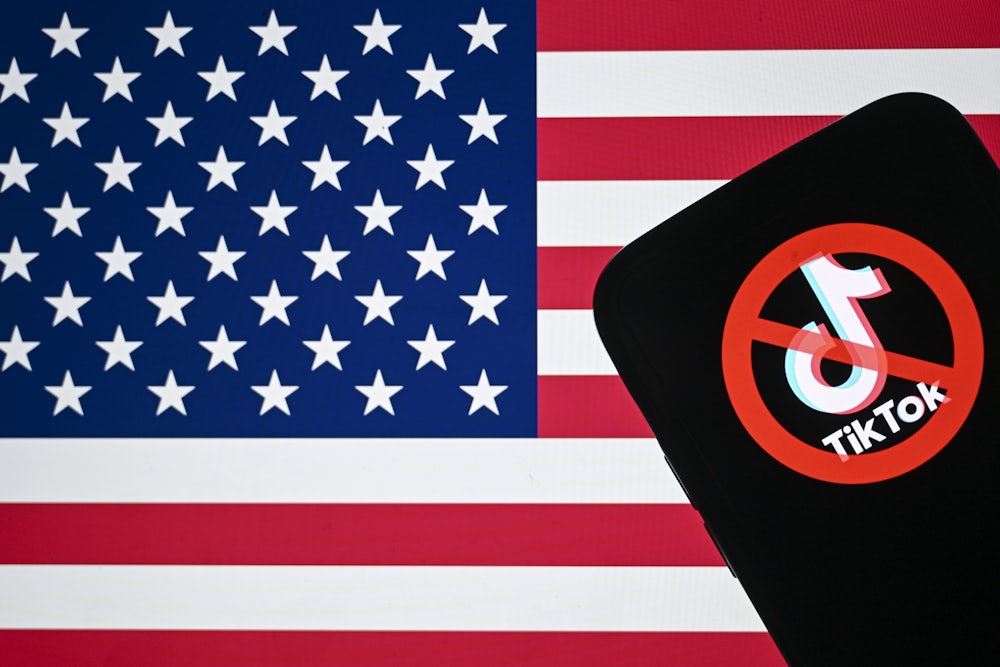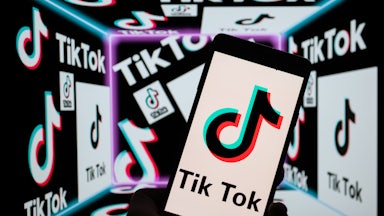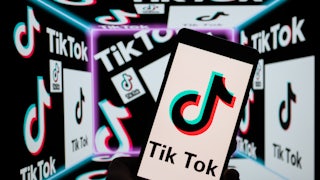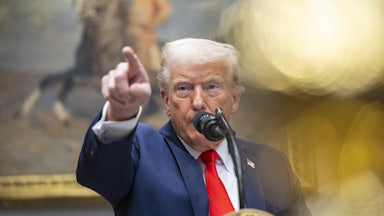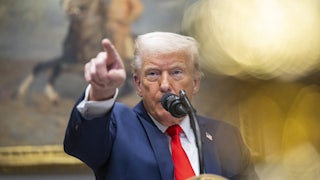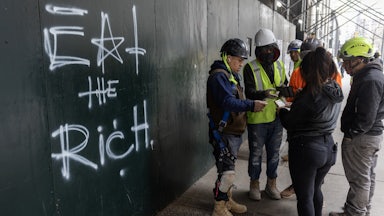For Chris Mowrey, a TikTok creator who posts popular videos focused on politics, the app represents more than just a platform: It provides a sense of community for his generation, connecting like-minded users and motivating them to take action.
TikTok had a “massive influence on young people getting out to vote” in the 2022 midterm elections, Mowrey argued to me in an interview, particularly for those Democratic-leaning voters who may have felt isolated in a red state or area. “When you can connect in a short-form video in a community, where you have all these comments of people saying, ‘It’s not pointless, I live here,’ or ‘I agree,’ it almost gives you this sense, like, OK, maybe we can get this thing done. And it drives you to make a decision, like going to the voting booth,” he said.
Mowrey, a 21-year-old student at Kennesaw State University in Georgia, is one of many TikTok creators who have carved out a place for themselves on the app; he’s amassed more than 61,000 followers on his account since September. His posts offer short bursts of earnest yet frenetic commentary, blond hair flopping into his eyes as he rants about Republican priorities or touts progressive policies, directly appealing to the camera in videos staged from his car or bathroom. The videos have the feel of a conversation with a particularly energetic and politically attuned friend, one who encourages others to care about the world as much as he does.
But Mowrey could soon lose his platform, and millions of young TikTok users their primary source of news and information, as Congress and the Biden administration mull taking steps to ban TikTok over growing national security concerns. Even if such drastic action is deemed by the federal government to be necessary, there will likely be significant political repercussions, potentially alienating young voters ahead of the critical 2024 elections.
Those security concerns aren’t unfounded. TikTok is owned by Chinese parent company ByteDance; the Biden administration and various members of Congress fret that user data can be accessed and shared with the Chinese government. The FBI and the Justice Department are reportedly investigating ByteDance’s use of TikTok to surveil U.S. citizens, including journalists. TikTok has also been a hotbed for misinformation.
Nevertheless, TikTok has 150 million active users in the United States, NBC News reported, with around 138 million of voting age. A recent Quinnipiac poll found that while 49 percent of Americans overall support banning TikTok, 63 percent of Americans between the ages of 18 and 34 oppose a ban.
TikTok is not the only social media app that has proliferated misinformation and disinformation about politics and elections, nor is it the only company that may be playing fast and loose with user data, although the U.S. government’s concern stems largely from whether that data is then being accessed and utilized by the Chinese government. Annie Wu Henry, who served as a social media producer on Senator John Fetterman’s campaign and ran its popular TikTok account, told me that Gen Zers might feel particularly targeted by a ban.
“I think that they are going to view it as if they’re getting their voices stifled in a medium that they as a generation have really owned,” Henry said. “There’s problems on every social media app, and taking the one away that Gen Z has really utilized—they’re the largest demographic on the platform. I think it’s very much going to be taken personally.”
Henry also contended that right-wing politicians could see that TikTok has been particularly useful for Democratic candidates and campaigns and provided a sense of community for more progressive young users. “I think on their own, younger people on the left have harnessed the power of mobilizing online where the right has not,” Henry argued.
In recent elections, the Democratic Party has largely benefited from younger voters turning out at the ballot box. The 2022 midterm elections saw the second-highest youth turnout in three decades, surpassed only by 2018, with most young voters preferring Democrats for the House of Representatives over Republicans. In a few years, Generation Z will represent the entirety of the critical 18-to-29-year-old demographic.
Democratic candidates have used TikTok as a tool to connect with younger voters, even as the Democratic National Committee warned campaigns against using the app in 2020. An October study by the Alliance for Securing Democracy found that 34 percent of Democratic candidates in Senate, House, governor, and secretary of state races had TikTok accounts. Fetterman, who defeated his opponent in a closely watched race this past November, racked up millions of views on videos from his campaign’s TikTok account, which has roughly a quarter-million followers.
“One of the things that I always wanted to keep top of mind in how we were using the platform was not only meeting people where they were at, but speaking the language that they were speaking,” Henry said about the Fetterman campaign’s TikTok strategy. The app has “massive reach,” Henry continued, allowing creators to connect with thousands or millions of viewers with very few resources, and providing a community in which to act: “People can organize and build power and coalesce, just as people do on the ground, in a different way and in a different format.”
TikTok has also been used by organizations as a mobilizing tool. NextGen America, a progressive group founded by billionaire Tom Steyer dedicated to mobilizing young voters, partnered with nearly 300 influencers on TikTok and Instagram to encourage youth turnout ahead of the 2022 midterm elections. “We saw a much higher engagement than you would see doing a social media post or even a paid-for advertisement, that we get a lot more traction when we partner with influencers that have their own trusted audiences of young people that engage with that content in a really organic way,” said Cristina Tzintzún Ramirez, the president and executive director of NextGen America.
While progressives are well represented on TikTok, they do not have a corner on the market; Republican candidates and groups are also present on the platform, and some conservative accounts like Libs of TikTok have massive followings. In December, Newt Gingrich argued that Republicans needed to have more of a presence on the app, even as he acknowledged that it could one day be banned: “If you want Generation Z voters you’ve got to be on TikTok, even if in fact in the long run we may abolish TikTok as a Chinese communist device.”
TikTok has increasingly become a top search engine for Gen Zers, and one recent survey found that 57 percent of Gen Zers rely on TikTok as a source for news or current events. While TikTok has struggled to stem the tide of misleading information on its platform, losing the app would force young Americans to turn to other sources. “I’ve never met a 21-year-old kid who has MSNBC or CNN on in the room or goes to [news] websites,” Mowrey said. “I don’t think a lot of those kids are going to be like, ‘Well, let me go turn on CNN for an hour and figure out what’s going on.’”
But Tzintzún Ramirez was more confident that if the federal government banned TikTok, Gen Zers would turn to other sources for information and political mobilization. “Young people migrate and start trends online very quickly. And there’s still huge platforms like YouTube and Instagram that can reach young people at scale. And so we’d just shift our resources to those platforms,” she said.
This is not the first time the U.S. government has set its sights on TikTok. Federal judges blocked President Donald Trump from banning the app in 2020. But the political landscape has changed in three years, with Democrats more willing to confront China. The U.S. has barred federal agencies from downloading TikTok on government devices, and a bipartisan crew of lawmakers this month introduced legislation—backed by the White House—that would allow the Commerce Department to restrict or ban technologies originating in six countries, including China. (A bill targeted specifically at banning TikTok due to its perceived security threat was also introduced last year.)
The Wall Street Journal reported last week that the Biden administration is seeking to induce ByteDance to sell its stake in TikTok or face a potential ban of the app. TikTok has pushed back against the demand, arguing that it would not address the perceived security concerns beyond the plan for safeguarding user data that the app has already proposed. Shou Zi Chew, the CEO of TikTok, will appear before a House committee later this week, where he will likely face intense questioning from members on both sides of the aisle.
Although potential repercussions are likely not at the top of mind for officials and lawmakers determining whether to ban or restrict access to TikTok, Mowrey guessed that some in the White House must be aware of the app’s influence on young voters.
“I think, in terms of the history of politics, it’s probably very weird for people in the Biden administration to say, ‘Hmm, maybe we shouldn’t ban a weird app on the internet because young voters are going to need that and they’re going to retaliate against us.’ That’s very odd,” Mowrey said. “But I hope someone in the Biden administration is ringing that bell, because it’s a real one.”
